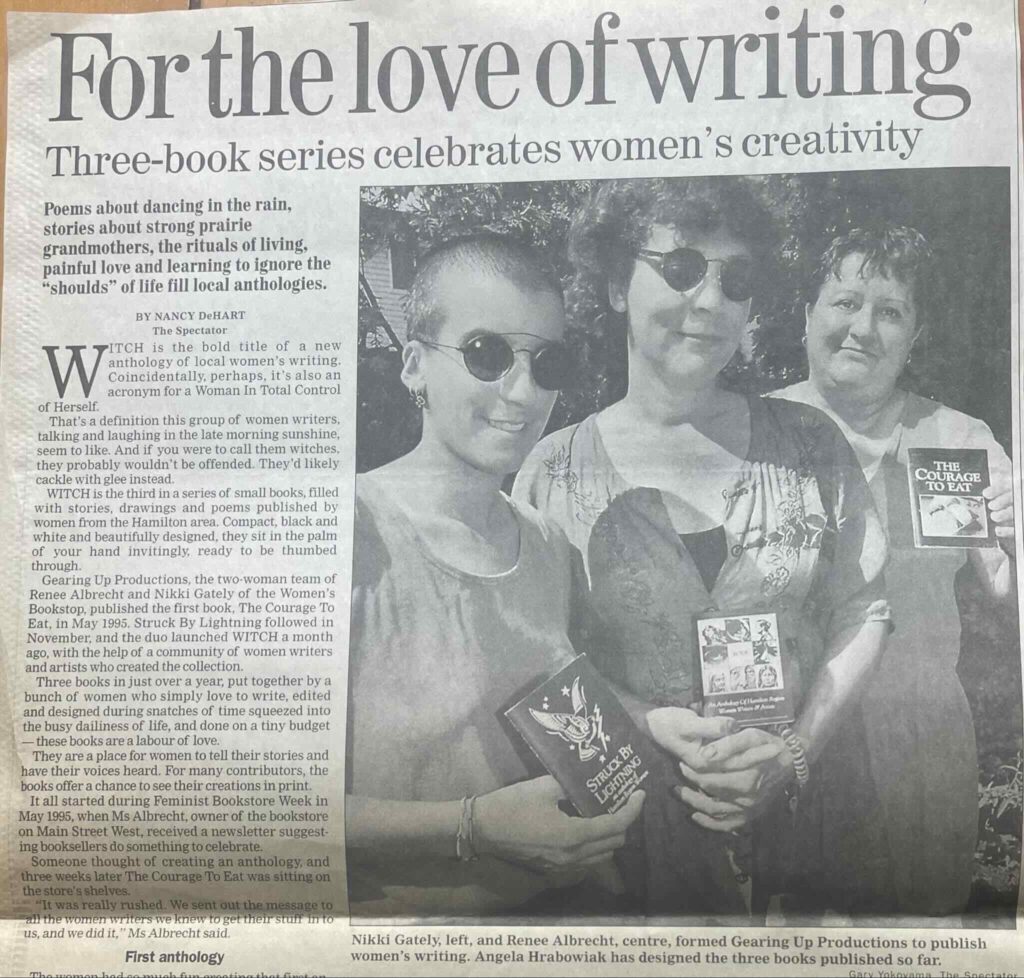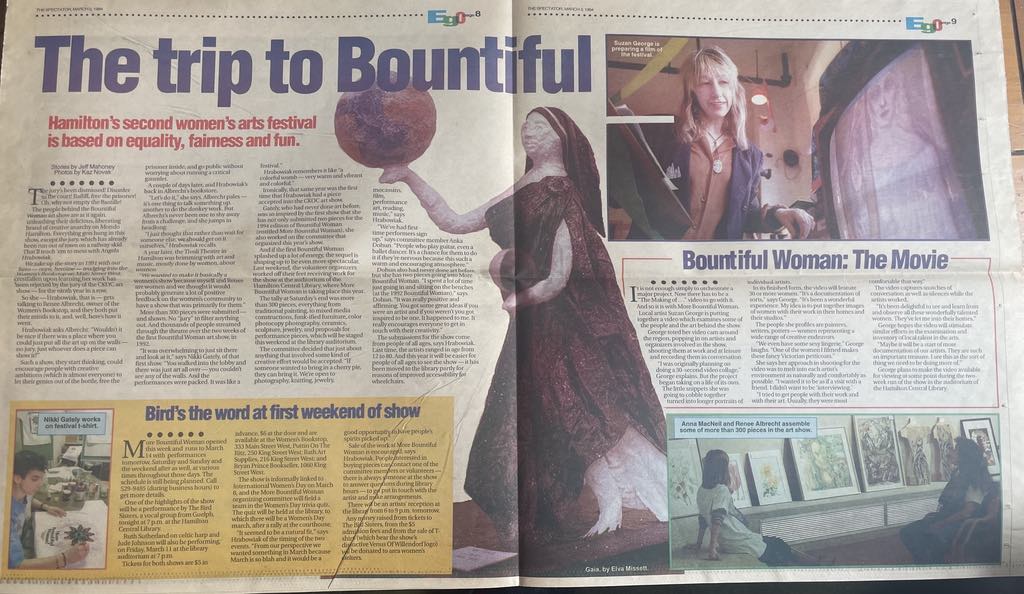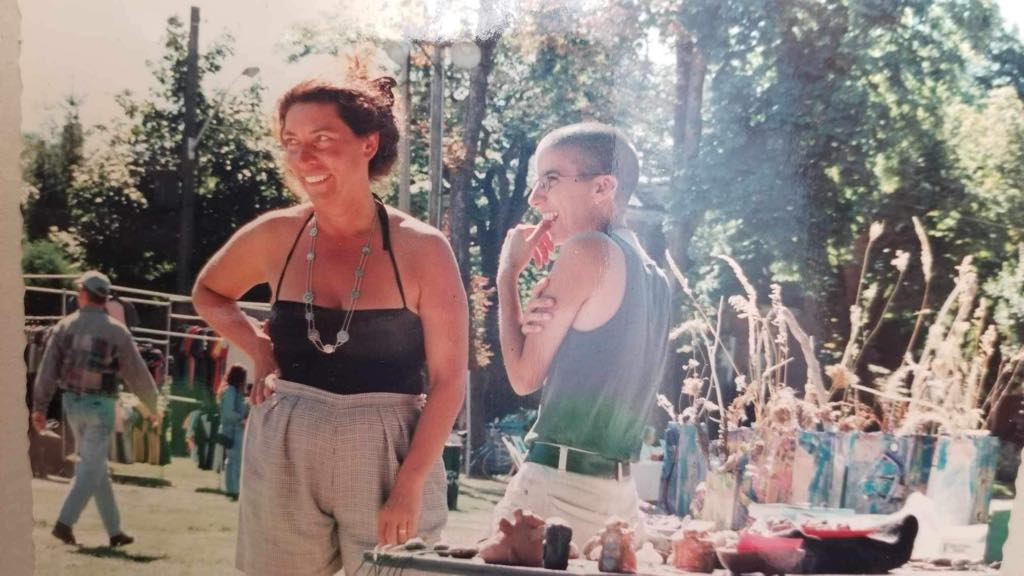OBITUARY: The formidable Renee Sagebear Albrecht made a profound impact

The owner of the ground-breaking Women’s Bookstop, a beacon for feminists and queer women, ‘brought the art of the possible to countless women,’ writes friend Cole Gately.
“A woman without a man is like a fish without a bicycle.” As far as we were concerned, a truer slogan had never been uttered. This was the defining concept at the Women’s Bookstop between 1985 and 2001, the year it closed.
Renee Sagebear Albrecht, the owner of the Bookstop, was a formidable presence. Her hair was gigantic, her features wide and arresting, and her demeanour friendly but intimidating. The first time I ever met her, I was dipping my toe into lesbian waters with a mixture of trepidation, extreme excitement, terror, and a sense of being naked in public. It was 1991.
She gave me a big smile, we chatted for a short time, and then I left without ever setting foot in the lesbian book section at the back of the shop.
I kicked myself for not being brave.
My great friend, Robin, came out as a lesbian at the same time I did, even though we were in different parts of the world when it happened – she in Australia, me in Vancouver. We had been friends since we were 16 and had confided to each other a few months before coming out, our feelings that we were “probably bisexual,” an often necessary first step into the full truth of lesbian identity. This is not to say that bisexuality is invalid – not by any means – but just that I wasn’t able to contemplate my lesbian identity quite yet.

By the time Robin and I saw each other again, we had fully come out and were now ready to become citizens of the lesbian nation. She was braver than me, and so she had made friends with Renee and managed to get us invited to see Lucy Blue Tremblay in concert in Maryhill, Ont. We piled into a big white van with no seats and drove to the “cuntreeside” with Renee and three other women – Zora, Lyn (RIP), and Diane, the driver.
The church hall was filled to the brim with lesbians from all over southern Ontario. I couldn’t believe my eyes! I was so excited and filled with wonder. Who had ever heard of women’s music? There was a whole world that existed right under my nose of which I knew nothing. Until that moment I don’t think I’d met more than one or two lesbians before, and one of them was Robin.
From that day on, those women took us under their wings, introduced us to the HUGS – Hamilton United Gay Societies – dances and the women’s dances. It was September, so a women’s dance was put on to celebrate Take Back the Night, another new phenomenon in my life.
By the end of that dance, two weeks after the Tremblay concert, I had a girlfriend, and so did Robin. I was walking on air.
I had had some experience bookselling during my gap years, and in the later fall of 1991, I started nine years of working at the Bookstop, located in a tiny former house (now a house again) at 333 Main St. W., between Locke and Pearl streets.
All witches, crones, and wise women know that 333 is the number of the Goddess.

Renee was happily married to her husband, Peter, for 45 years but she was fiercely pro-women, and most of her friends were lesbians. She had an uncanny intuition and drive to defy the patriarchal, heterosexist culture of the 1990s. The women’s community of social service leaders, lesbians, writers, artists, activists and musicians was formidable. The Women’s Bookstop was so much more than a bookstore; it was a community hub. Books are not a retail commodity, they are a gateway to culture, identity, politics, community, nature, relationship, power, and meaning. The books were a vital component of the synergy created by women who were pissed off with patriarchy, believed in the indomitable power of women to change the world, and created art, music, and stories to demonstrate their refusal to capitulate to efforts to silence or marginalize them. Indeed, none of the community and connections and change were possible without the books. They facilitated conversations, igniting and stoking the fires of women’s righteous anger.
I read a recent post from a woman whose colleague ventured into the Bookstop 30 years ago, looking for dieting advice. Renee invited her to think of the store as a source of self-love, feeding your body and soul, and not starving yourself. This conversation changed the woman’s life. Renee had many conversations like this, gently but firmly introducing women to their true purpose.
Renee and I formed a production company and anthologized the writing of local women in five titles, one of which was called The Courage to Eat. I produced the cover art, which was a friend’s beautiful and ample belly superimposed onto a freshly baked loaf still in the pan. Another title was Bite Me, a collection of women’s sexual fantasies. Women from all walks of life submitted writing, art, and helped with publishing savvy. We also brought Ani DiFranco to town just a few months before she became a household name. With other women, we produced women’s dances at the downtown YWCA after the previous organizers burnt out, always welcoming trans women, and DJing and selling drinks ourselves.

The Bountiful Woman Art Show has gone down in history as the only all-woman art show in Hamilton, and possibly Ontario, ever. In each iteration, more than 300 women artists displayed art that filled every wall throughout the entire Tivoli Theatre, the Workers’ Arts and Heritage Centre and the Hamilton Public Library. It was up for six weeks each time and was a sensation. Some women, including me, had never shown their art before. It had never occurred to me that I could produce anything worth exhibiting.
Renee’s vision, along with that of many friends, most notably the great, late Angel Hrabowiak, brought the art of the possible to countless women in Hamilton, who unleashed their creativity on this industrial, working-class steel-making town, considered by outsiders to be an undesirable place to call home.
It's exhibitions like Bountiful Woman and art spaces like Hamilton Artists’ Inc., The Gallery on the Bay, Workers’ Arts & Heritage, and You Me Gallery that helped shape Hamilton into the art hub it is now.
After the Bookstop closed its doors in 2001, during the rise of big box, discount book retail outlets like Chapters/Indigo, Barnes & Noble, and Amazon, Renee was feeling bruised. Every day for 16 years, her whole life centred around the Women’s Bookstop and the community of feminists that supported, and were supported by it. Now it was gone, and people easily slid into buying discount books, eventually ordering books online and turning towards video, blogs, podcasts, and binge-worthy, ad-free television.

My colleague and I often talk about the importance of history and legacy in making sense of the world. Hamilton would look very different if independent bookstores, like the Women’s Bookstop, Bryan Prince Booksellers, the Occult Bookstore, Hither Page (children’s bookseller), Chapman Books, and a Different Drummer Books in Burlington, as well as the galleries mentioned above hadn’t opened their doors, inspired GritLiT and writing groups, guest authors, book clubs, and created communities of changemakers.
Until her passing at the age of 69 on April 9, Renee lived an extraordinary life – writing, making art, organizing, howling at the full moon, reading, learning, and refusing to live a mediocre life. Everything she did brought a profound greatness. Her tiny village of Canso, Nova Scotia, is feeling lost with the news of Renee’s death. She instituted a public library, organized writing workshops, wrote several books and articles, became a homeopathic doctor, and gave her all to the place where she finally found solace. She and Peter split their time between Canso, Hamilton and Sauble Beach, Renee living life on her own terms, calm, quiet, contemplative.
READ COLE GATELY'S TRANSGENDER JOURNEY
When I speak, which is often, about how much I love Hamilton, my thoughts always turn to the Women’s Bookstop and the 1990s. I have an amazing life even now, 23 years later, which would not be the case had I not found Renee and the community of women who saw the bookstore as their gathering place, their refuge, their home. I stepped into the Bookstop a naïve and lost young woman, feeling empty and disillusioned. Ten years later, I emerged confident in myself as a feminist, enraged with the patriarchy, and determined to build on my learnings from Renee and the women who came to the Bookstop to speak, listen, read, organize, laugh, howl, and be heard.

Cole Gately is an adult educator from Hamilton. He has an MA from Ontario Institute for Studies in Education (OISE) at University of Toronto and a Bachelor of Arts from McMaster University. He has lived in and been active in Hamilton since the late 1980s, focusing on anti-racism, feminist and 2SLGBTQ+ organizing, homelessness intervention, and inclusion. He divides his time between Europe and Ontario.













